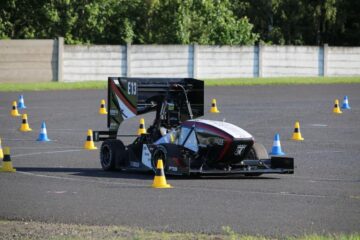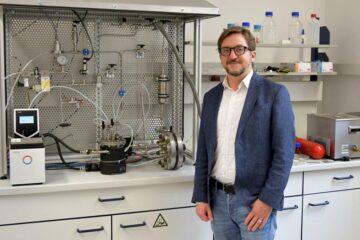Focus on Epilepsy – Large European Medical Congress in Vienna

The Sixth Congress on Epileptology will commence on Sunday the 30th of May, 2004, at the Austria Center Vienna. This biannual European congress is one of the largest conventions in Europe dedicated to a single medical indication. During five days, more then 3000 delegates from all over Europe and beyond will attend over 70 sessions. They will present, discuss and teach a diverse range of aspects of epilepsy – a health problem that will affect up to three percent of the European population at some time in their lives.
Every alternate year, the International League Against Epilepsy (ILAE) – a non-profit organisation with official links to the World Health Organization (WHO) – organises the largest European convention on epilepsy. The Austrian capital Vienna has been chosen to host the event in 2004, and the organisers are supported by the Austrian chapter of the ILAE. From May 30th to June 3rd, more than 3000 delegates from over 80 countries will assemble to address the health problem of epilepsy from scientific, clinical and societal perspectives.
Prof. Gerhard Bauer (Austria), Co-Chairman of the International Organising Committee explains: „The European Congress on Epileptology is Europe’s most eminent convention to communicate recent developments in epilepsy. It is internationally renowned for its scientific quality and comprehensive programme which bring together clinicians and scientists from across Europe. Vienna, now at the centre of an enlarged European Union, very well symbolises this pan-European spirit of the congress. Due to this as well, we are very happy to host the 6th European Congress on Epileptology here.“
Throughout the extensive programme, the latest results from a wide variety of projects on scientific, clinical and societal aspects of epilepsy will be presented. These include:
Scientific aspects
In general, the special attention of the scientific aspects that epilepsy attracts lies in the fact that epilepsy like no other neurological disease opens a window on human brain function to study basic mechanisms of language, memory, emotion and other higher cortical function from the network level down to single cell recordings. During the congress, one particular focus will be the genetic, molecular as well as physiological mechanisms of epilepsy and how these mechanisms may contribute to the phenomenon that many epilepsy patients respond well to modern antiepileptic drugs and why 30-40% do not. Also, the potential of modifying some of those mechanisms in order to increase the percentage of patients that respond well to medication will be debated.
Clinical aspects
At one of the four main sessions, new treatment options for epilepsy will form the central theme. The treatment options that will be presented include among others, tailored pharmacotherapy by using pharmacogenetics, epilepsy surgery, brain stimulation, and neurotransplantation using stem cells. In another main session, the causes, genetic backgrounds and courses of several epilepsy syndromes will be discussed.
Societal aspects
One entire main session will be dedicated to the co-existence of additional neuro-psychological and psychiatric problems in epilepsy patients. Also, the social stigma associated with this health problem will be discussed. The latter frequently affects the patient’s quality of life more than the seizures themselves. Furthermore, one session focuses on the improvement of resources for appropriate standards for epilepsy care in Central and Eastern Europe.
During the chairman’s symposium on Monday, 31st of May (9-11), seven eminent experts from seven countries will present and discuss the contribution that basic sciences such as mathematics, physics, genetics, anatomy, and physiology make to clinical practice – and whether stem cells offer new potential for therapy (full abstracts will be available at www.epilepsyvienna2004.org/press.asp from Sunday 30th May onwards). A further highlight of the programme will be the award of two prizes for outstanding contributions to epileptology. These are the prestigious European and Austrian Epileptology Awards that will be presented on Wednesday (2nd June) and Thursday (3rd June) respectively.
However, inasmuch as the congress serves as a venue for honouring those who help epileptology to advance, it is also a forum for identifying problems that remain unsolved and need attention. „Recent progress in epileptology has greatly reduced the burden for many patients,“ explains Prof. Christoph Baumgartner (Austria), Chairman of the Scientific Advisory Committee. „However, only relentless efforts to advance the insight into scientific, clinical, and societal aspects of epilepsy will further reduce the implications for the patients,“ he adds. In the past few years, Austrian epileptologists have made well-received contributions to the detailed analysis of seizures, diagnostic methods and also to the genetic analysis of the causes for therapeutic difficulties. Furthermore, they also supported a sociological study that identified shortcomings in the public understanding of epilepsy in Austria. Prof. Baumgartner adds, „The 6th European Congress on Epileptology will allow experts from Austria to share and advance their knowledge on epilepsy. The ILAE along with the national chapters provide the ideal platform with this congress to strive for the best diagnosis, therapy and patient care for a health problem that affects 65,000 individuals in Austria alone.“
Media Contact
Weitere Informationen:
http://www.epilepsyvienna2004.org/scient_full.aspAlle Nachrichten aus der Kategorie: Veranstaltungsnachrichten
Neueste Beiträge

Ideen für die Zukunft
TU Berlin präsentiert sich vom 22. bis 26. April 2024 mit neun Projekten auf der Hannover Messe 2024. Die HANNOVER MESSE gilt als die Weltleitmesse der Industrie. Ihr diesjähriger Schwerpunkt…

Peptide auf interstellarem Eis
Dass einfache Peptide auf kosmischen Staubkörnern entstehen können, wurde vom Forschungsteam um Dr. Serge Krasnokutski vom Astrophysikalischen Labor des Max-Planck-Instituts für Astronomie an der Universität Jena bereits gezeigt. Bisher ging…

Wasserstoff-Produktion in der heimischen Garage
Forschungsteam der Frankfurt UAS entwickelt Prototyp für Privathaushalte: Förderzusage vom Land Hessen für 2. Projektphase. Wasserstoff als Energieträger der Zukunft ist nicht frei verfügbar, sondern muss aufwendig hergestellt werden. Das…





















